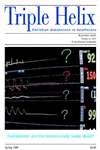'Family doctors and community nurses in the lead' is a key theme of 'The new NHS - Modern and Dependable'. But what kind of family doctors will they be? Jamie Harrison and Tim van Zwanenberg have brought together a number of authors to seek to answer that question for the benefit of patients, managers and doctors. This is a tall order for readers having such different concerns so they propose different routes through the book: no one is expected to start at chapter 1!
The core of the book is a series of experiments on developing career patterns for future family doctors. How are you going to get people to work in practices under strain? What about pressures in mid-career? Can we support people who are isolated in rural districts? Above all, how are we going to get people started on a worthwhile career in primary care once they've finished training? These may not sound like new problems, but the authors set the scene by suggesting that changes in training, the organisation of primary care, information technology, the nature of the consultation and, above all, the worldview of people in this post-modern society, give them a new perspective.
Doctors' wants and patients' expectations are discussed at length. Do they conflict? The authors do find ways to reconcile them although it is not always clear how a 'continuing relationship' with a GP can be developed alongside part-time working and portfolio careers. Perhaps it is the needs of the doctors, regaining control of their destinies, rather than the service, which seem the focus of the book? Nurses do not figure as much as they might -especially the idea of nurse-led primary care. It also seemed sad that a profession-al vocation should be seen as a key and altruism as no more than a defence which may give way under stress. This may be true for post-modern people, but what about the Good Samaritan?
Despite these comments, this is a useful book. It does more than raise questions, it sets an agenda for thinking through answers. All interested in primary health care would benefit from reading it.
Reviewed by
Carl Whitehouse
(Professor of Teaching Medicine in the Community, University of Manchester)































